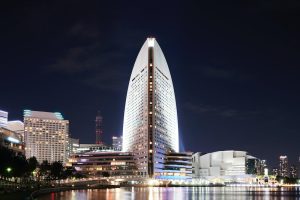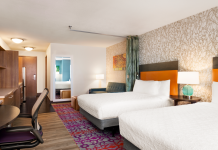Japanese luxury hotel operators are strategically expanding their presence to cater to the growing demand from wealthy overseas tourists, a demographic expected to constitute a significant majority of their guests. Leading the charge is the renowned Palace Hotel, situated opposite the Imperial Palace in Tokyo, which plans to increase the number of hotels it operates across Japan by 2.5 times by 2030.
Japan's most prestigious Imperial Hotel is set to open a new property in Kyoto, marking its first foray into new hotel developments in three decades. This move comes as the Japanese government recognizes a shortage of luxury accommodations as a bottleneck in its efforts to boost spending per person by travelers from abroad.
Luxury hotel operators are making substantial investments to expand their offerings, aiming to meet the increasing demand from affluent foreign visitors, particularly from the U.S., Europe, and Australia. Palace Hotel Tokyo, for instance, intends to create a network of around 10 properties by 2030, up from its current four, including a new establishment in Kyoto set to open in the spring of 2026.
Despite the challenges posed by the COVID-19 pandemic, the number of overseas visitors to Japan has shown resilience, with the Japan National Tourism Organization reporting a 0.8% increase in October 2023 compared to the same month in 2019. While the rebound from China remains gradual, visitors from the U.S., Europe, and Australia are making longer trips and spending generously, particularly at luxury hotels.
This shift towards luxury accommodations is evident in the increased proportion of foreign guests at renowned establishments. At Palace Hotel Tokyo, foreign guests accounted for approximately 75% of total guests in October 2023, reflecting a significant rise from the pre-pandemic levels.
The surge in affluent visitors has led to a notable increase in the Average Daily Rate (ADR) at hotels across Japan. Palace Hotel Tokyo, for instance, has seen its ADR rise to close to $690 from the pre-pandemic level of $400, while Imperial Hotel Tokyo witnessed an increase to the $400 level in October 2023 from $250 in March 2019.
Recognizing the potential in catering to high-end travelers, Tokyo-based property developer Hulic is set to invest tens of millions of dollars in directly managed luxury hotels and inns in Japan, doubling the number of properties to 38. Their focus includes building new properties in scenic locations such as Jogashima, Karuizawa, Jozankei, and Arima Onsen.
As the Japanese government shifts its overseas tourism policy to prioritize quality over quantity, the push for luxury accommodations is gaining momentum. While Japan currently has a limited number of five-star hotels compared to other countries, efforts are underway to attract high-end lodging facilities to smaller cities. Daisuke Yoshihara, president of Palace Hotel, expressed optimism, stating, "We will be invited from abroad to manage hotels if we brush up our brands among foreign tourists." This strategic approach reflects a concerted effort to position Japan as a premier destination for luxury hospitality.

























